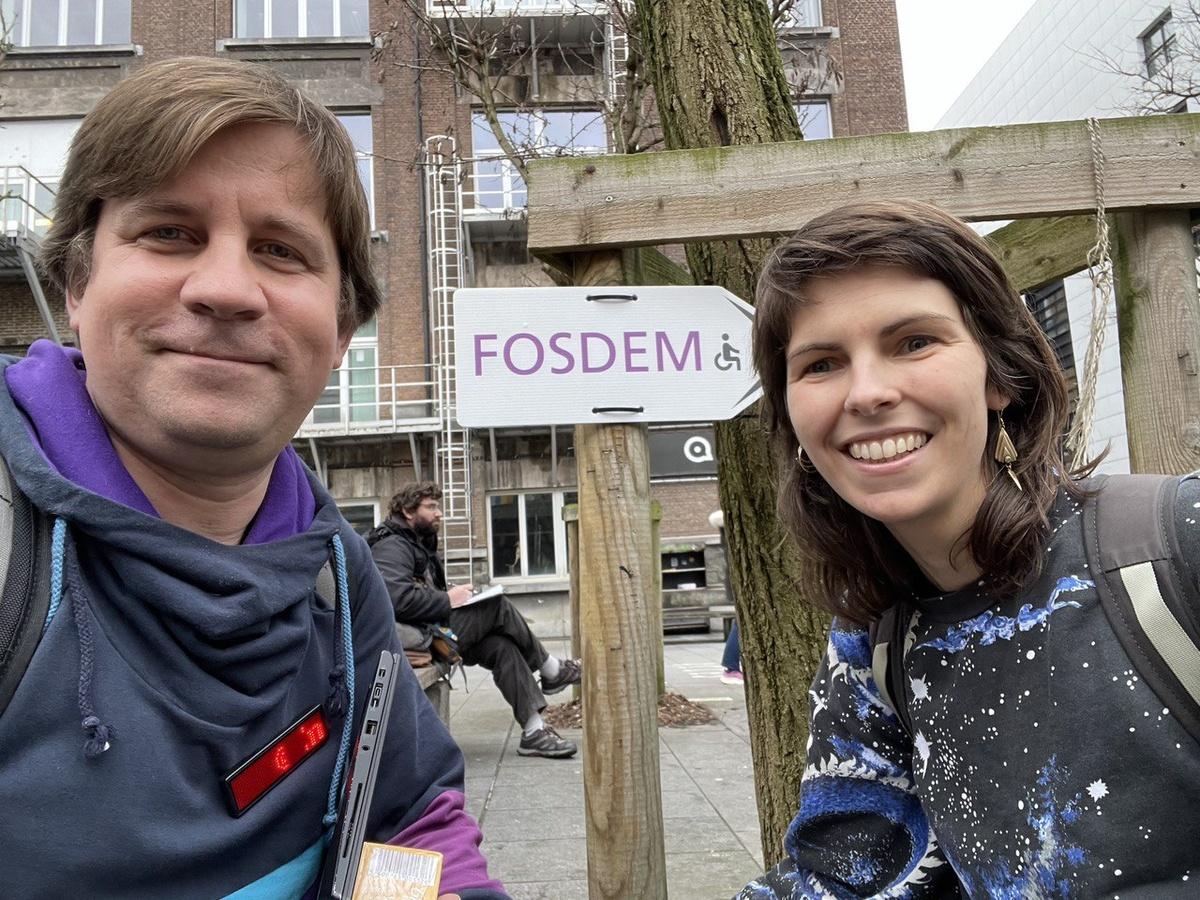07.02.2023 // Anjusch und Tasso waren im Februar bei der FOSDEM
Auf der internationalen Open Source Messe in Brüssel werden die neusten Entwicklungen vorgestellt. Netzwerken mit den Altbekannten und Knüpfen neuer Verbindungen: alles war dort möglich.
Link: https://offene-werkstaetten.org/de/post/fabaccess-goes-fosdem
Am 4.2. und 5.2. fand die FOSDEM in Brüssel statt. Eine internationale Open Source Messe, auf der die neuesten Entwicklungen dieses Feldes vorgestellt werden. Tasso und ich (Anjusch) haben dort allerhand bekannte Gesichter getroffen, wie zum Beispiel Pieter von Interfacer, der oben mit auf dem Foto drauf ist.
Tasso hat FabAccess in einem sehr anschaulichen Lightning Talk vorgestellt (den Talk gibt's hier online) und prompt haben ihn Entwickler aus Trieste angesprochen, die ebenfalls an einem Zugangssystem für Werkstätten basteln. Der Austausch mit ihnen wird auch nach der FOSDEM weitergehen...
Auch Matrix und Nextcloud waren mit Ständen dabei. Beides open source-Systeme, die wir beim VOW nutzen und bei denen wir dabei sind, sie für alle Mitgliedswerkstätten nutzbar zu machen. Infos über Matrix findet ihr bereits hier.
Tasso und ich hatten jedenfalls viel Spaß und haben viele interessante Leute und Projekte kennengelernt :-)
Das Exzerpt der Veranstaltung (https://archive.fosdem.org/2023/schedule/event/fabaccess)
FabAccess
a machine access system for fablabs and makerspaces
We are developing an open source federatable management system for FabLabs, Makerspaces and Hackerspaces. FabAccess aims to manage access to machines in order to avoid accidents. FabAccess has three main functionalities: - Machine management - Authorization system - User management
Machine management
We want to combine Neil Gershenfeld's idea of users learning to operate machines independently with the requirements of open workshops that users do not injure themselves in the process. Thus, users need instruction for dangerous machines, and this principle is then reflected in the authorization system.
The principle of FabAcces is to switch machines on and off via the power connection or via internal firmware. This way, machines are normally de-energized and therefore harmless. Only when users are at the machine who are competent and instructed for safe operation, the machine gets connected to the power supply by FabAccess.
The management of machines that require cleaning after use is supported, either. This ensures the usability of machines for the next user and reduces wear and tear.
We also support the reservation of machines, but we do not want to take over scheduling for the users. Therefore, as a compromise we implement that users can reserve machine only for half an hour (as a modifiable parameter). So they don't have to worry about someone else using the machine while they commute to the FabLab.
Authorization system
The authorization system makes it possible to allow access to machines only for certain users. Thus, it can be used to map instructions for dangerous machines, but more complex mappings are possible due to the high configurability of the RBAC system (role-based access system).
It is also possible to map simple machines that do not require instruction but need to be used in a somehow structured way (workplaces, tools, lockers, ..).
User management
The user administration should make it possible not to lose track of the users in the space. FabAccess is intended to be used as a SmartCard system, so each user receives an NXP Mifare DESFire (FabCard) card to authenticate himself at the machine.
In order to reduce the administrative effort, users can register on their own and can then be activated after the operator has checked their data. The user contract is mapped in the process and may be integrated into other systems.


